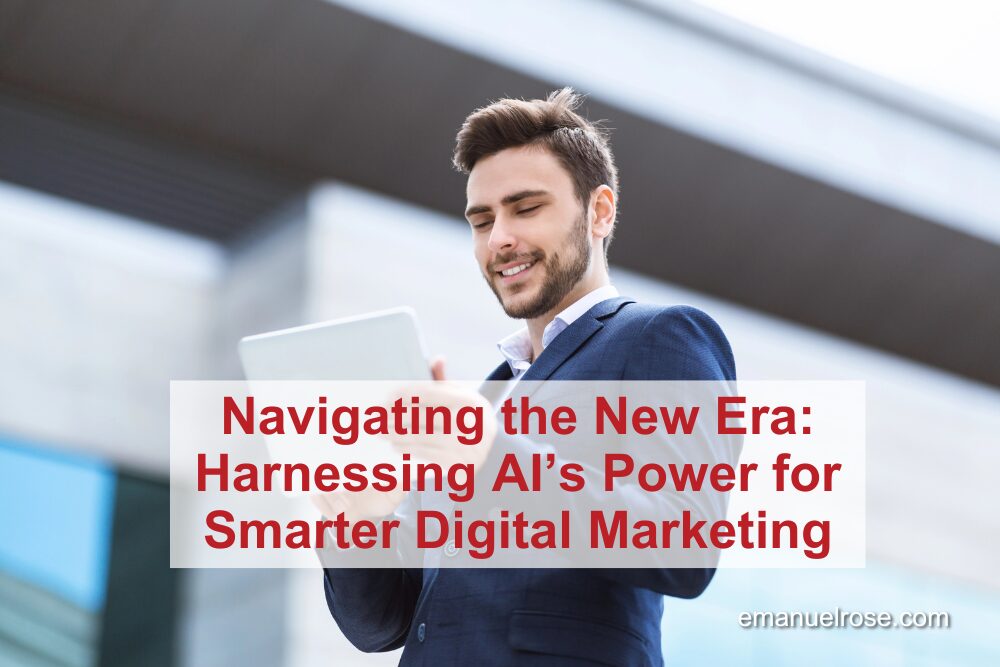As AI continues to reshape digital marketing, businesses are presented with an opportunity to evolve or risk falling behind. This profound technological shift allows companies to engage with their audiences personally, transforming the foundational approaches to marketing strategies. The birth of large language models (LLMs) marks a seismic shift akin to the advent of the internet, offering unparalleled access to data insights that precisely define ideal customer profiles.
No longer are businesses confined to one-size-fits-all tactics. AI empowers marketers to craft personalized messages and strategies, adapting to the nuanced preferences of diverse customer segments. AI-driven automation revolutionizes customer interactions, enabling real-time engagement, predictive analytics, and hyper-targeted campaigns. As AI technologies become more advanced, they provide an infrastructure capable of executing a spectrum of tasks—from automating responses to analyzing consumer behavior and optimizing content delivery.
The Power of AI-Driven Analysis
The ability of AI to analyze vast amounts of data and produce actionable insights is transforming how businesses approach marketing. AI tools refine campaigns, enhance strategies, and improve customer engagement by dynamically adjusting based on data trends. This includes crafting targeted emails, generating high-performing content, and refining digital presence through predictive optimization.
For instance, businesses can now leverage the model context protocol (MCP) capabilities, a cutting-edge release by Anthropic. This protocol enables language models to access tools directly, allowing AI to perform tasks like querying databases, updating content, and executing complex operations seamlessly. Companies benefit by integrating this technology into their frameworks, reducing inefficiencies, and enhancing strategy and execution.
Beyond content creation, AI assists in consumer sentiment analysis, enabling brands to gauge real-time audience responses. By identifying trends and sentiment shifts, companies can precisely adjust messaging, pricing, and offerings, ensuring maximum resonance with their target markets.

Security and Ethical Considerations
As AI becomes deeply embedded in marketing strategies, businesses must prioritize data privacy and security. AI integration introduces ethical considerations regarding data usage, consumer trust, and regulatory compliance. Striking a balance between leveraging AI’s capabilities and maintaining ethical standards requires organizations to implement clear governance structures and ensure transparency in data collection practices.
Consumers are increasingly aware of data privacy issues, making it critical for companies to handle personal information responsibly. Businesses must invest in robust cybersecurity measures and comply with global data protection regulations such as GDPR and CCPA. Clear communication about AI-driven processes and consumer data usage can foster trust and reinforce brand credibility.
Addressing AI’s Challenges
Despite AI’s remarkable capabilities, its application comes with challenges. The quality of AI-generated outputs depends heavily on the clarity and accuracy of the input prompts. Mastering the art of prompting is essential to achieving meaningful and reliable results. Additionally, businesses must navigate potential issues such as data biases, misinformation, and digital fragmentation.
Human oversight remains crucial in refining AI-generated content and ensuring that marketing campaigns align with brand identity and ethical standards. AI should serve as an augmentation tool rather than a replacement, allowing marketers to focus on strategic decision-making and creative storytelling.

Strategic Integration and Future Outlook
Effectively integrating AI into marketing strategies requires a precise alignment with business objectives. Companies that leverage AI tools must continuously establish iterative feedback loops to refine AI-generated insights. Successful integration involves adopting AI solutions that enhance, rather than replace, human expertise.
By incorporating AI into content marketing, customer service, and analytics, businesses can streamline workflows, reduce inefficiencies, and allocate resources to higher-level strategic planning. AI-powered chatbots, recommendation engines, and automated ad placements are just a few examples of how businesses optimize marketing efforts and improve consumer experiences.
A Future-Forward Approach to Marketing
While AI provides transformative opportunities, its value lies in how effectively businesses utilize its capabilities. Marketers must remain agile, continually adapting strategies to meet shifting consumer behaviors and technological advancements. AI should be viewed as a tool to enhance human creativity and efficiency, not as a replacement for authentic brand storytelling.
Companies exploring AI-driven solutions should prioritize transparency, ethical considerations, and continuous learning. Organizations that balance AI automation and human oversight will be well-positioned to maintain a competitive edge while delivering personalized and impactful customer experiences. Businesses that strategically harness AI will unlock new levels of efficiency, engagement, and growth in an increasingly data-driven marketplace.
We appreciate Robert Douglass’s perspective. As companies adapt their approaches, AI plays a crucial role in enhancing interactions, tailoring messaging, and maintaining a competitive edge.
Get to know Robert Douglass: linkedin.com/in/roberttdouglass
Get to Robert’s company: openstrategypartners.com
Watch the Marketing in the Age of AI podcast featuring Robert Douglass: youtu.be/5kw1Sw7YKFg


